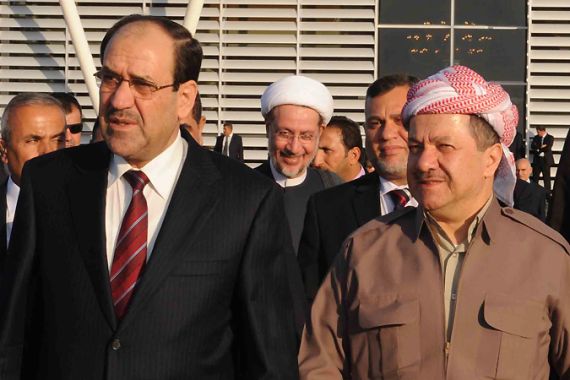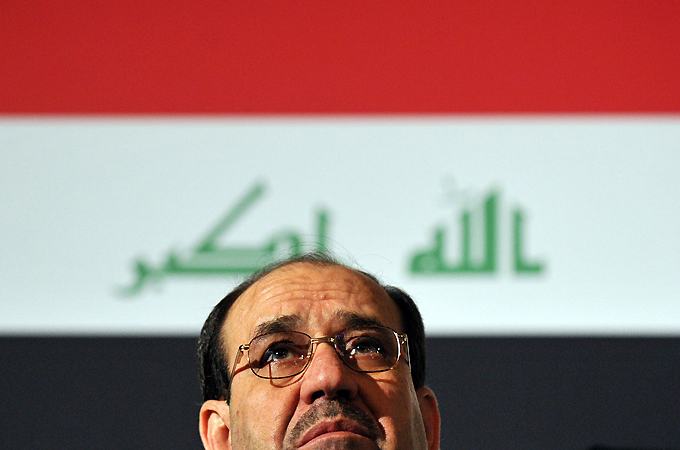Iraqi politicians ‘break deadlock’
Rival blocs set to form new government in deal that would allow al-Maliki to remain prime minister.

 |
|
Al-Maliki’s party said it would form a government even if other blocs chose to boycott the parliamentary session [AFP] |
Iraqi politicians appear to have broken an eight-month political impasse by agreeing to take part in a new government headed by Nouri al-Maliki, the incumbent prime minister.
Officials said on Wednesday that the Sunni-backed Iraqiya coalition that had been opposing the prime minister decided to join his government.
Iraqiya joins the Kurdish alliance in supporting al-Maliki following months of contentious negotiations.
“Finally, fortunately, it’s done. It’s finished. All the groups are in it,” Mahmoud Othman, a Kurdish politician who took part in the nearly seven hours of negotiations, said.
Ali al-Dabbagh, a government spokesman and member of al-Maliki’s State of Law coalition, said Iraqiya had decided after extensive talks to accept the parliament speaker’s job and cede al-Maliki the prime minister’s job.
An official with Iraqiya, who asked not to be identified, confirmed that the coalition had agreed to take the parliament speaker’s position in a deal that would see al-Maliki stay on for another four years.
Iraqiya will decide on a nominee from the party for speaker of parliament at a meeting on Thursday, which will be just the second parliamentary meet since an inconclusive election on March 7.
Iraq has been without a government since the vote, which gave Iraqiya two more seats than al-Maliki’s bloc. Neither had enough for a majority in parliament, forcing the factions to negotiate a government.
Repeated rejection
Over the past months, Iraqiya had repeatedly rejected another al-Maliki term and demanded the right to form the government as the top vote winner in the election.
Politicians from al-Maliki’s National Alliance said they would proceed with government formation as
long as they had a political majority – even if other blocs chose to boycott Thursday’s parliamentary session.
“We do not imagine a government that does not represent all Iraq’s factions … But the government does not and will not stop, God forbid, if a list stays behind,” Ibrahim al-Jaafari, a senior member of the National Alliance, said.
“We don’t expect major surprises in this deal,” Rawya Rageh, Al Jazeera’s correspondent in Baghdad, said.
She said al-Maliki would likely remain prime minister and Jalal Talabani, a Kurd, would retain the presidency.
Rageh also said the deal could include a new strategic council intended to serve as a check on the prime minister’s power.
Iraqiya would take the speaker’s post, the foreign ministry and a role with possibly expanded authority over defence issues, the economy and foreign affairs.
Parliament met briefly in June, but politicians said they needed more time to decide who would hold the highest offices.
Last month, Iraq’s high court ordered parliament to resume its sessions, putting pressure on politicians to expedite a deal.
The long deadlock has fuelled tension – even as sectarian violence that came after the 2003 US-led invasion has been receding – while US forces prepare to withdraw in 2011.
A series of attacks on Christian targets across Baghdad on Wednesday stirred renewed fear in the minority community.
The bomb and mortar blasts occurred just 10 days after a bloody siege at a Catholic cathedral in the capital that killed 52 people.